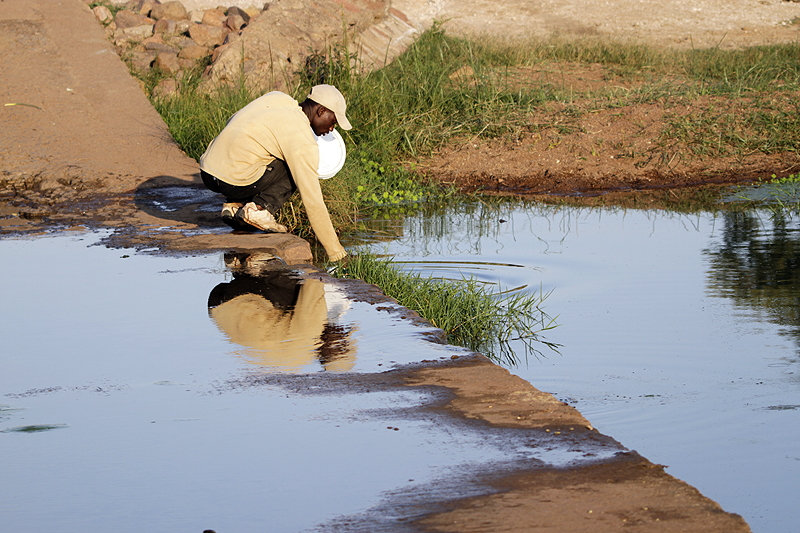
Water issues have never been easy to articulate and execute. Apart from being largely environmental, water issues are equally political and emotional too.
PETER MAKWANYA
They need to be handled with the greatest of care. One can raise emotions to boiling point if the subject of water is handled without diligence and utmost care. Water security is key to human livelihoods, especially food security, sanitation and nutrition.
When water is scarce and in depleted supplies, people cry or may engage in verbal warfare or practical water conflicts and wars. But when water is in abundant supplies, people misuse it or rather does not seem to know what to do with it that is from its sources to its end users.
The availability of water is normally caught up in the intricate webs of competing demands, negligence, poor planning and management as well as the menace of climate change. Water governance and management do not seem to always go hand in glove, whether knowingly, unknowingly and in moments of crass ignorance as well.
Quite a number of phrases have been coined with regard to water, chief among them being, ‘water is life’ but surprisingly, very few people have bothered to watch over their water footprints that is measuring the amounts of water that they use every day. The simplest undertaking is for an individual to try and calculate the quantities of water they have used for cleaning their teeth since they were born. Surely streams would overflow while many drums would be filled up. We are careless and reckless in the manner we use water.
Long ago it was very possible for people to maintain water sources qualitatively, not because they were few but they were responsible and accountable. Today, due to industrialisation, carelessness and greed, some water sources have become no go areas and they are equally scaring and threatening. Therefore, quality water is essential for sanitation, be it in small or large quantities.
While water is quite an important ingredient in industrial processes, it is today deliberately contaminated and always released into fresh water sources like rivers, streams and dams. As such, consumers are always major candidates and unconscious contenders for water-borne diseases and life threatening gut-infections.
- Chamisa under fire over US$120K donation
- Mavhunga puts DeMbare into Chibuku quarterfinals
- Pension funds bet on Cabora Bassa oilfields
- Councils defy govt fire tender directive
Keep Reading
Companies and industries that have negative footprints in the contamination of water have never been taken to task in this country. People have watched helplessly while environmental watch-dogs can only bark but sadly they have no teeth to bite. No company has actually been sued and paid medical bills for endangering people’s lives.
I am not quite sure if this is a result of lack of binding water policy in this regard. People are made to drink water laced with hazardous chemicals and pollutants in towns and cities while councils have never been brought to book for gross negligence. It is the duty of relevant councils and authorities to source water chemicals for their inhabitants. If consumers, by any chance happen to drink safe and purified water that day, they would question on what would have gone wrong as they are used to situations where drinking polluted water is the norm.
Although the repealed Water Act appeared restrictive and draconian, there happens to be so many fingers engrossed in water governance issues. At the end of the day nobody will be truly accountable in this manufacture of confusion. As a result, who polices who in ensuring that there is quality water for consumption? There is also a problem somewhere along the line from the source, suppliers and end users. Hence, clear-cut policy formulations and enactment need to be revisited to ensure sustainable water governance necessary for mitigating climate change.
Among a host of players in water issues in this country, it is still unclear who should bear the brunt of water governance and how do they articulate and implement policy issues in such a tradition of disorder and duplication. Zimbabwe is not a starved water nation as compared to other Sadc countries which at the same time have better water management systems in place. Social, political and economic power relations in this country need to be normalised and ameliorate the mess they have created especially in terms of water management.
With the threat of climate change no longer a joy-ride story, but stark reality, the re-organisation of the stakeholders in water management need a reality check.
The generality of Zimbabweans can as well never be absolved from wrong doing in water mismanagement. We are quite a wasteful lot. Sustainable water management is key to climate change adaptation and mitigation. The way people manage water, even on a small scale should go a long way in the preservation of the ecosystem functions which guarantee quantity and quality of sustainable water supplies.
Over exploitation of ground water also leads to depleted water levels thereby increasing climate related water scarcities and challenges. The more the bloated water-actors continue to thrive, the more competing policies, role duplication, hyper-chaos and finger pointing prevail.
Concepts like the Integrated Water Resources Management (IWRM) are not new to the highly articulate Zimbabweans. In fact, there are experts in this area, in this country as compared to many other countries but they are not being consulted.
As such a yawning planning gap will continue to manifest its ugly head. In the face of climate challenges, it shouldn’t be taken for granted and as a given that people know. Instead they need to be assisted and guided to avoid large scale water losses. Unregulated gold panning continues to thrive unabated, rendering the streams and rivers shallow and unreliable water holding sources. These unsustainable small-scale mining activities have contributed to large scale water losses. As a result the country has lost its resilient water preservation capacity.
●Peter Makwanya is a climate change communicator. He writes in his own capacity and can be contacted on: [email protected]











